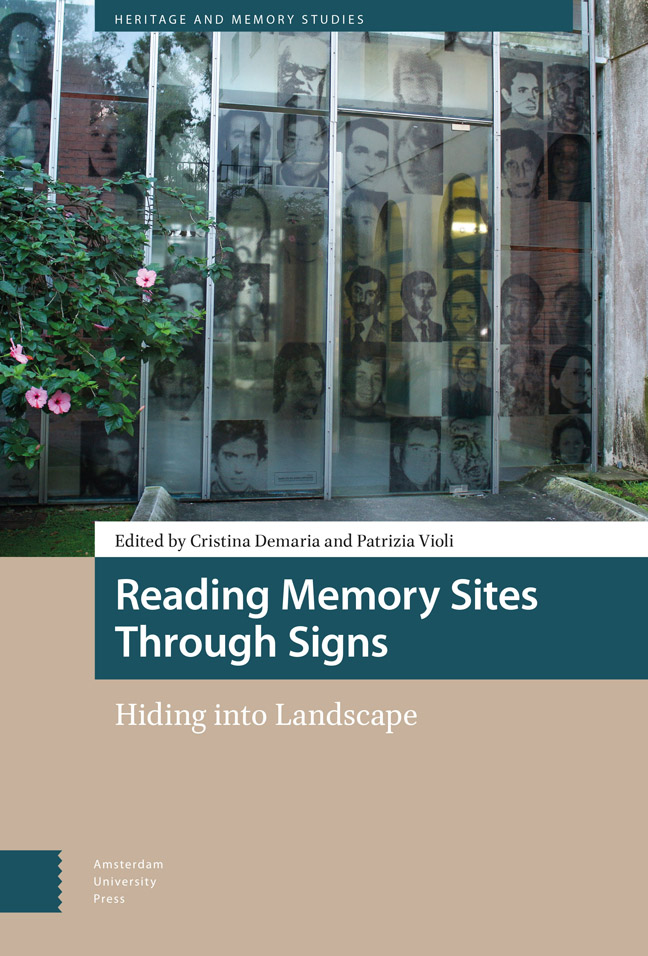Book contents
- Frontmatter
- Contents
- List of Illustrations
- For a Semiotics of Spaces of Memories: Practices of Enunciation and Narratives from Monuments to Global Landscapes of Inheritance
- 1 Stories that Shape Spatialities: Lieu and Milieu de Mémoire through the Lens of Narrativity
- 2 Interpretation and Use of Memory: How Practices Can Change the Meanings of Monuments
- 3 Uncomfortable Memories of Fascist Italy: The Case of Bigio of Brescia
- 4 What Does Fascist Architecture Still Have to Tell Us?: Preservation of Contested Heritage as a Strategy of Re-Enunciation and ‘Voice Remodulation’
- 5 Berlin, the Jewish Museum and the Holocaust Memorial
- 6 Making Space for Memory: Collective Enunciation in the Provincial Memory Archive of Córdoba, Argentina
- 7 Ruins of War: The Green Sea and the Mysterious Island
- 8 Turning Spaces of Memory into Memoryscapes: Cinema as Counter-Monument in Jonathan Perel's El Predio and Tabula Rasa
- 9 Voices from the Past: Memories in a Digital Space: The Case of AppRecuerdos in Santiago, Chile
- 10 500,000 Dirhams in Scandinavia, from Mobile Silver to Land Rent: A Semiotic Analysis
- Index
- Index of Names
4 - What Does Fascist Architecture Still Have to Tell Us?: Preservation of Contested Heritage as a Strategy of Re-Enunciation and ‘Voice Remodulation’
Published online by Cambridge University Press: 17 February 2024
- Frontmatter
- Contents
- List of Illustrations
- For a Semiotics of Spaces of Memories: Practices of Enunciation and Narratives from Monuments to Global Landscapes of Inheritance
- 1 Stories that Shape Spatialities: Lieu and Milieu de Mémoire through the Lens of Narrativity
- 2 Interpretation and Use of Memory: How Practices Can Change the Meanings of Monuments
- 3 Uncomfortable Memories of Fascist Italy: The Case of Bigio of Brescia
- 4 What Does Fascist Architecture Still Have to Tell Us?: Preservation of Contested Heritage as a Strategy of Re-Enunciation and ‘Voice Remodulation’
- 5 Berlin, the Jewish Museum and the Holocaust Memorial
- 6 Making Space for Memory: Collective Enunciation in the Provincial Memory Archive of Córdoba, Argentina
- 7 Ruins of War: The Green Sea and the Mysterious Island
- 8 Turning Spaces of Memory into Memoryscapes: Cinema as Counter-Monument in Jonathan Perel's El Predio and Tabula Rasa
- 9 Voices from the Past: Memories in a Digital Space: The Case of AppRecuerdos in Santiago, Chile
- 10 500,000 Dirhams in Scandinavia, from Mobile Silver to Land Rent: A Semiotic Analysis
- Index
- Index of Names
Summary
Abstract
This chapter attempts to revisit some issues related to the recent debate on so-called ‘difficult heritage’ (Macdonald) from a semiotic perspective. More specifically, the symbolic weight of the monumental (especially architectural) material legacy of past totalitarian regimes is examined in terms of a temporal transformation of its ‘ideological voice’. According to this theoretical proposal, the material changes induced by restoration and rehabilitation works can be analysed as operations of ‘remodulation’ of the voice of monumental architectures, which can be framed by a semiotic theory of enunciation. Through the analysis of a series of case studies of Italian Fascist monumental buildings and their subsequent material transformation over time, a typology of different possible forms of remodulation is proposed.
Keywords: Difficult Heritage; Theory of Enunciation; Architecture and Ideology; Voice of Architecture; Semiotics of Architecture
Difficult Heritage and its Conflicting ‘Voices’: an Enunciational Approach to Contested Monumental Architecture
The aim of this paper is to test how analytic tools of narrative semiotics may help in framing and understanding some of the issues related to the preservation of controversial heritage. A semiotic approach will be used to account for the meaning effects determined by different solutions of transformation of architectural and monumental legacies originating from a problematic past, and whose collective perception (and meaning) has changed because they are associated with values which a society does not identify with anymore, such as in democratic countries that have experienced a dictatorship in the past.
My case studies are examples of monumental architecture built in Italy during the Fascist period and restored or refurbished in the last few decades. More specifically, I shall try to describe some cases of ‘difficult heritage management’ in Italy, looking at some solutions of transformation or restoration of Fascist architecture, through the lens of the semiotic notion of ‘enunciation’ (as developed especially in Benveniste's and, later, Greimas's theories and by their followers).
The choice of this analytical angle lies in the central hypothesis of my paper: any monumental architecture has its own ‘voice’, through which it ‘speaks’ in public environments.
- Type
- Chapter
- Information
- Reading Memory Sites through SignsHiding into Landscape, pp. 101 - 140Publisher: Amsterdam University PressPrint publication year: 2023



